Microsoft Surface Pro Review
by Anand Lal Shimpi on February 5, 2013 9:00 PM ESTSurface Pro as a Tablet
If you can get over the bulk, Surface Pro is easily the fastest tablet on the market today. Apple has done a great job of making relatively slow hardware feel very fast with iOS, but Surface Pro brute forces its way to the top. Web pages load quicker than on any ARM based tablet and multitasking is just awesome on the device. This is where the power of Intel’s Core microarchitecture really comes into play.
Since the introduction of the 3rd generation iPad with Retina Display several folks have pointed out to me that UI frame rate isn’t always so smooth on the device. I personally never noticed because I found that most of the competition was even worse, so it always seemed relatively smooth to me. After playing with Surface Pro however and going back to even the 4th gen iPad all of the sudden frame rate stutters are much more noticeable. Playing around with Bing maps on Surface Pro vs. RT is like night and day. Even if you compare scrolling and zoom performance to native iOS maps on the iPad 4, Surface Pro wins out.
Scrolling in web pages, application install time, file copy time, everything is just significantly faster on Surface Pro than on any competing tablet. Oh, and it boots (from full power off) in less than 10 seconds. It’s really the combination of the great CPU performance and fast SSD that deliver the responsiveness of the Surface Pro.
We’re still lacking good cross-platform performance tests, but there are a few browser based benchmarks that I can use to highlight just how much faster Surface Pro is compared to anything ARM based on the market today:
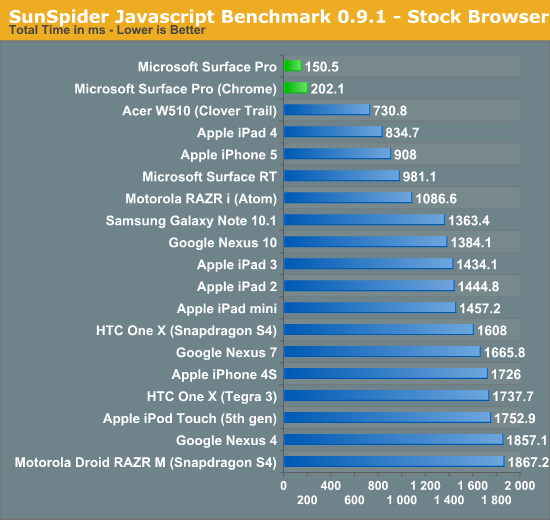
SunSpider is our tried and true quick js benchmark, and here we see huge scaling as we move to Intel's Core i5. Regardless of browser used you're seeing a significant improvement in performance that directly translates to faster web page load times.
Moving on we have Kraken, a seriously heavy javascript benchmark built by Mozilla. Kraken focuses on forward looking applications that are potentially too slow to run in modern browsers today. The result is much longer run times than anything we've seen thus far, and a very CPU heavy benchmark:
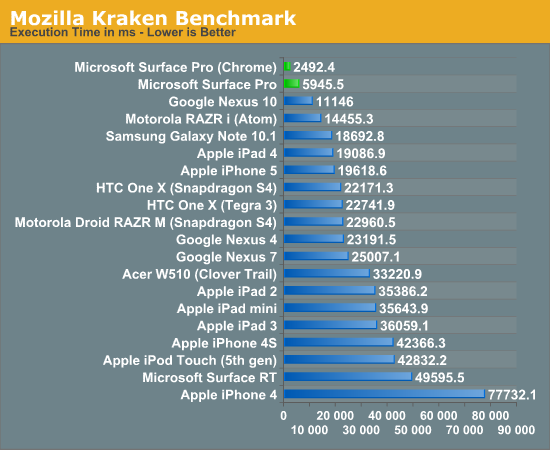
Even when handcuffed by modern IE10 you're looking at almost twice the performance of the Nexus 10. Level the playing field with Chrome as a browser and now Surface Pro completes the test in a bit more than 1/8 of the time of the iPad 4, or 1/4 of the time of the Nexus 10.
Surface Pro manages to deliver almost 5x the performance of the iPad 4 here.
We have one last web-based benchmark: WebXPRT by Principled Technologies (PT). WebXPRT measures performance in four HTML5/js workloads:
Photo Effects: Measures the time to apply effects to a set of six photos. The filters are Sharpen, Emboss, and Glow. WebXPRT applies each filter to two photos. This test uses HTML5 Canvas 2D and JavaScript.
Face Detect: Measures the average time to check for human faces in a photo. WebXPRT runs this test on five photos and uses the average time to calculate the final result. This test uses HTML5 Canvas 2D to get access to photo data. The detection algorithm is implemented in JavaScript.
Stocks Dashboard: Measures the time to calculate financial indicators of a stock based on historical data and display the result in a dashboard. The calculations are done in JavaScript, and the calculated stocks data is displayed using HTML tables and Canvas 2D.
Offline Notes: Measures the time to store notes securely in the browser's HTML5 local storage and display recent entries. This test uses using AES for security.
We're reporting the overall score after all tests have been run:
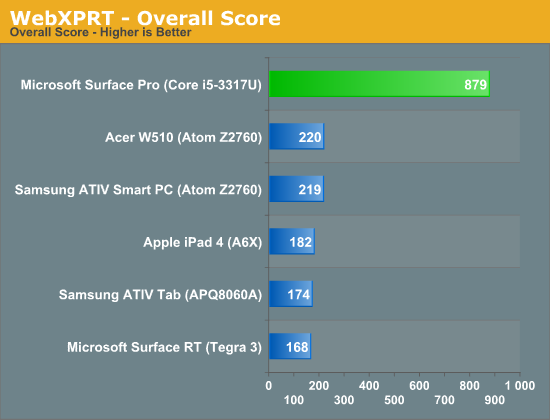
Next up are another set of benchmarks from PT, but unlike the WebXPRT suite these tests don't run in a browser. Once again we're looking at performance in a handful of tasks designed to stress the CPU. Here the performance advantage continues to be quite significant. While Surface RT and the other Windows RT/8 devices still feel a bit sluggish, I have no performance complaints whatsoever about Surface Pro:
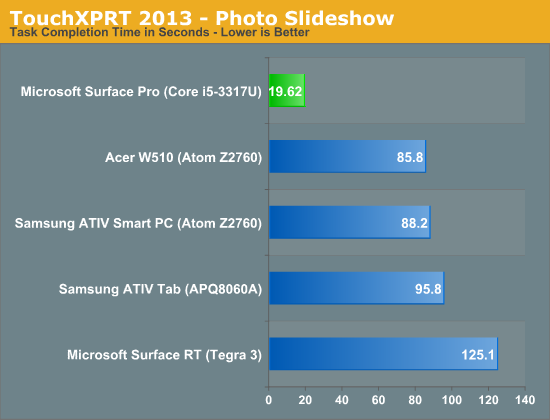
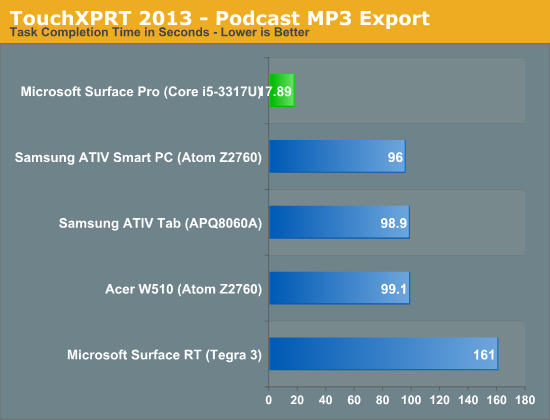
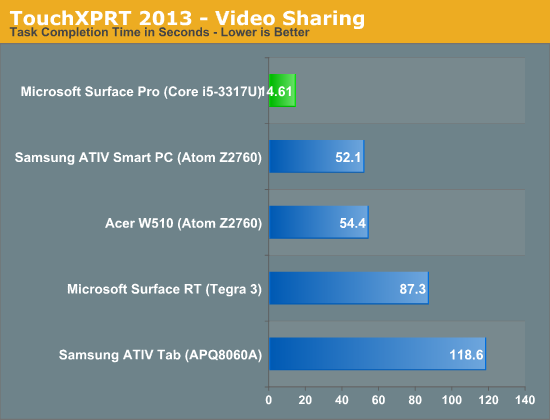
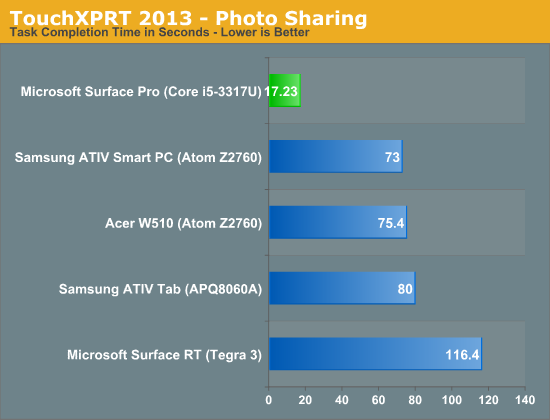
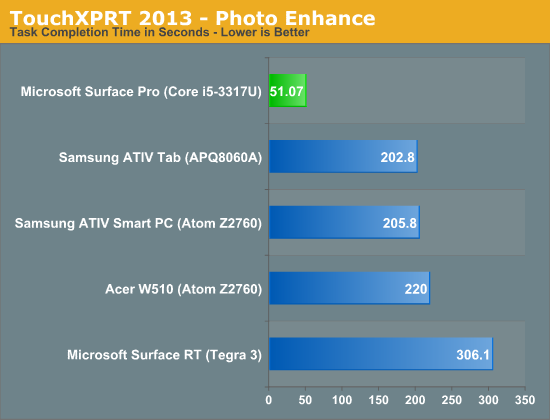
If I had any complaints about using Surface Pro as a tablet outside of weight, they’d be about Windows 8. There are still far too many bugs and quirks in the OS that just don’t make sense. I’ve outlined some of my issues with Windows 8 before. I think the UI works just fine for a tablet, it’s just the unfinished touches that need attention. For example, having to gesture in modern IE10 before being able to switch between tabs seems silly.
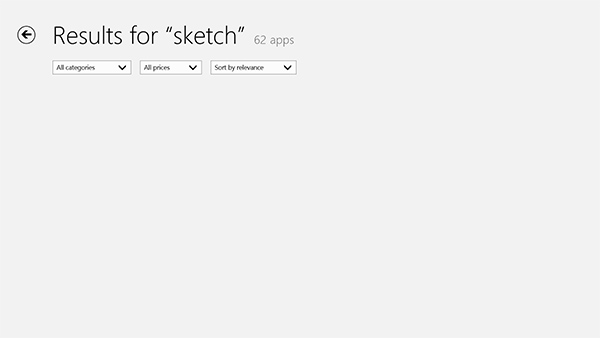
This still happens way too often in the Windows Store, no indication of what's going on just a blank screen
On the bug-front, all too often I’ll wake up the system only to have the lock screen upside down. And despite all of the extra performance under the hood, the time from when you hit the power/lock button to when something appears on the screen is just longer than on an iPad or Android tablet. We’re not talking several seconds, but it’s still noticeably longer.










228 Comments
View All Comments
bobjones32 - Tuesday, February 5, 2013 - link
Since the Surface Pro is basically half-tablet and half-laptop, wouldn't it make sense to include a graph that compared it to other laptops too? Based on the numbers here, it seems like the Surface Pro would come out well ahead of the Macbook Air 11", for which its specs and price seems to most directly compare to.karasaj - Tuesday, February 5, 2013 - link
I second this. I would like to see it compared with laptops as well - a lot of the other tests included laptop comparisons as well.Anand Lal Shimpi - Wednesday, February 6, 2013 - link
The problem is our Windows 8 battery life suite only has one datapoint at this point: Acer's 13-inch S7 ultrabook, which I did include in a table below the graphs on the battery life page. I will try to run the 11-inch MBA this week/weekend in the new suite to get a good reference point though.Take care,
Anand
remain_insane - Wednesday, February 6, 2013 - link
Awesome! It will be nice to see that included in here so we can see that comparison and have the PRO be put into against another similarly priced competitor.:)
bobjones32 - Wednesday, February 6, 2013 - link
Cool. I was specifically looking at your 11" Macbook Air review from last year where it got around 4 hours of battery, vs. the numbers here.Anyway, great review! Thanks.
JanieMartin - Thursday, February 7, 2013 - link
Love my job, since I've been bringing in $5600… I sit at home, music playing while I work in front of my new iMac that I got now that I'm making it online.(Click Home information)http://goo.gl/VkxIT
phillyry - Friday, February 15, 2013 - link
^That's SPAM right above me ^apollomission19 - Tuesday, May 7, 2013 - link
Dont click the LINK in previous comments... pure SPAM! This should have a "report" button or something to report this piece of *hit.TwistByrn - Wednesday, February 6, 2013 - link
I would also like them to specify that the RT and the PROs 128GB of storage is partially used up by the operating system were as the iPads storage is not used by the OS.ATGS-Jason - Friday, February 8, 2013 - link
Actually, the iPad's storage IS used by the OS as well, they're not separate. More importantly, iOS is nowhere near on the same level of capability as Windows 8 or RT. With regards to the Pro, the proper comparison is to the Macbook Air, which uses almost exactly the same amount of the integrated SSD as Windows 8 Pro does (within 2GB), except that the Win8 Pro total on Surface Pro includes a complete recovery partition that can be offloaded to a USB drive. When you do that, Windows 8 on Surface Pro actually takes up about 7GB *less* than the Mac OSX stock installation on an Air.